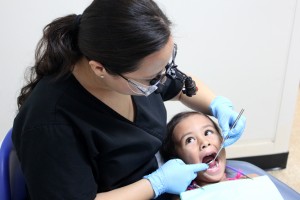According to the Centers for Disease Control and Prevention dental cavities are the most common chronic disease of childhood – four times more common than asthma! By preschool almost 25% of children have cavities and by kindergarten over 40% of children have cavities.
A common misconception about baby teeth is, “They’re just baby teeth, and they’re going to fall out anyway.” So, what’s the big deal? Why is it so important to take care of these teeth that our children lose later?
The first reason is because cavities can lead to toothaches, missed school, and when cavities become large enough they can cause infections of the mouth. These infections can negatively impact the adult teeth forming underneath the baby teeth. Also, if tooth infections aren’t treated they can spread and lead to more serious health complications. Toothaches also mean we can’t eat as well and that can have negative effects on our nutrition.
Another important reason to care for our baby teeth is that it’s a time to form good oral habits to learn to care for our adult teeth. We have 20 baby teeth and later will get 32 adult teeth. We begin to lose baby teeth around age 4 and will continue to lose them through age 12. Adult teeth start coming in around age 6! Dentists call this the “mixed dentition stage” because we have both baby teeth and adult teeth. But bacteria and plaque causing cavities on our baby teeth can easily cause cavities on our neighboring adult teeth. Keep in mind that the adult teeth are present between the baby teeth, not just in the front or back of the mouth.
A third reason to take care of the baby teeth is that they are place holders for our adult teeth. If a baby tooth has a large cavity, part of the tooth often breaks off and the tooth is smaller than it should be. Teeth get lonely, and will shift around to find another tooth to touch, causing space loss. If a baby tooth is lost early, the surrounding teeth shift or drift into the space that was supposed to be saved for the adult tooth that comes in later, sometimes not until 12 years of age! The result is more significant crowding, or crooked, adult teeth (which doesn’t look as nice, but more importantly are even more difficult to keep clean). If the teeth drift far enough they can block another adult tooth from coming in. This can make straightening the teeth or achieving a stable way for your teeth to fit together later very challenging and much more expensive in the long run.
Dental cavities in children are largely preventable and if we take good care of baby teeth, we are setting our children up for much healthier adult teeth. Help your child brush twice daily and floss at least once daily. It is recommended that your child see a dentist once every 6 months for cleanings and exams. At these visits your dentist or hygienist can help discuss good oral hygiene habits, good nutrition, and answer any other questions you may have.

